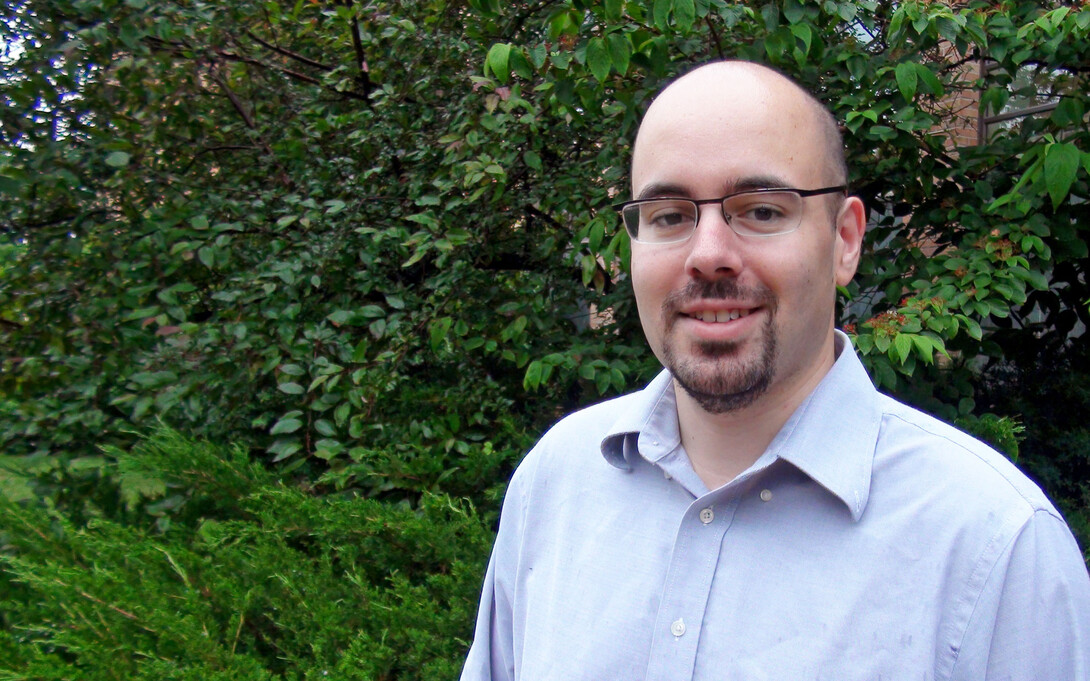
James Schnable, assistant professor of agronomy and horticulture, received the inaugural North American Plant Phenotyping Network Early Career Scientist Award at the Phenome Conference in Tucson, Arizona, Feb. 6-9.
The award seeks to highlight leaders in novel research, increasing the visibility of plant phenotyping (peer reviewed publications, presentations, social media, popular press and service), supporting research between public and private sectors, developing (or following) data standard best management practices and/or transdisciplinary engagement.
Schnable joined the university in 2014 and is affiliated with the Center for Plant Science Innovation and the Quantitative Life Sciences Initiative.
He has been studying how plants perceive and respond to their environments for more than 10 years with the goal of developing tools to study functional genetic variation across multiple species. His research involves collaborations with engineers, computer scientists, statisticians and food scientists.
He has also been involved in plant phenotyping for the past six years, although at first he considered it more of a hobby. It allowed him to connect science with Raspberry Pis, miniature computers that can cost as little as $25 but can be programmed to take pictures, collect information from other sensors and send the information back to a research wirelessly.
In 2015 he was encouraged by Brian Larkins, then the associate vice chancellor for life sciences, and Jennifer Clarke, director of the Quantitative Life Sciences Initiative, to turn that hobby into a second research program focused on high throughput plant phenotyping.
Schnable considers himself to be extraordinarily lucky. It can be really hard to get established in a new line of research and high throughput plant phenotyping was a new field in 2015. He wasn’t far behind as almost no one had much experience with this line of research back then.
The second stroke of luck for Schnable happened because Nebraska decided to invest significantly in a high throughput phenotyping facility at Nebraska Innovation Campus. The automated greenhouse, built by the university with support from the Nebraska Research Initiative, can grow and image corn and sorghum all from germination to maturity.
“The final, and most important, way I was lucky, was to be lucky with people. I was hired as part of a large batch of new faculty in the Institute of Agriculture and Natural Resources,” Schnable said. “My first two years felt like the first day at a new high school. No one knows who to sit with at lunch yet. That makes it is so much easier to both make new friends and build new collaborations.”
Yumou Qiu, assistant professor of statistics at Iowa State University, and Yufeng Ge, assistant professor of biological systems engineering at Nebraska, were hired at the same time as Schnable and have become his favorite research collaborators.
Zhikai Liang, doctoral student in agronomy and Schnable’s first graduate student, came to his lab as a molecular biologist wanting to learn genomics. Over the past four years, Liang has gone from pipettes to RNA sequencing to now writing his own computer programs to analyze pictures of plants and hyperspectral data cubes. He has also published nine different scientific papers in that same time period.
“Winning this award says as much about the amazing teams I’ve been a part of, both inside and outside my own research group, as it says about any efforts or abilities of my own,” Schnable said.
The Phenome Conference represents a multidisciplinary community comprising plant biologists, ecologists, engineers, agronomists, computational scientists and representatives from U.S. federal agencies who come together in a rich and diverse networking environment to foster collaboration, innovation and the initiation of multi-investigator and multi-institution projects.
NAPPN, founded in 2016, is an association of scientists and researchers in the rapidly evolving area of plant phenomics, formed as a regional partner of the International Plant Phenotyping Network. Schnable has been a member since the beginning.







